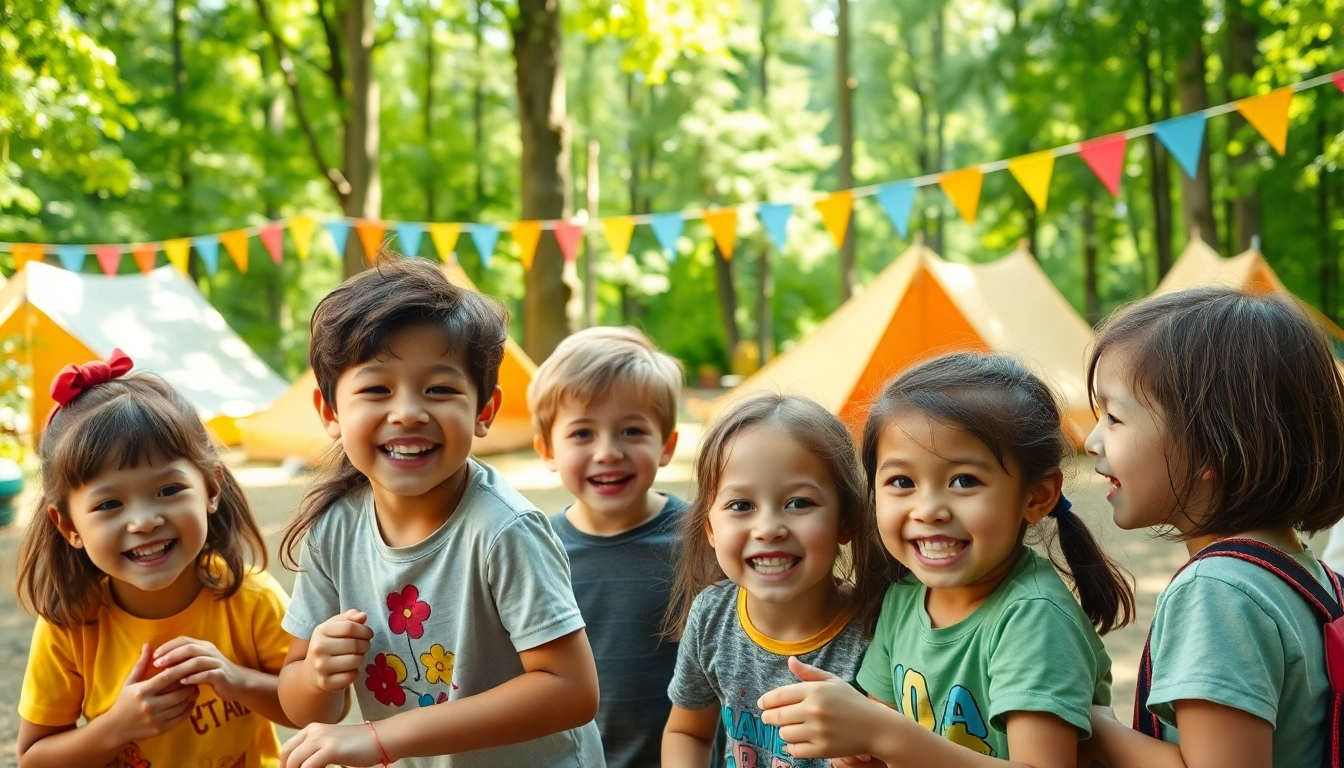Understanding Holiday Camps
Holiday camps have gained immense popularity as a joyful escape for families looking to spend quality time together. These camps provide a unique experience, combining accommodation with engaging activities, entertainment, and educational programs. Within this structure, families, especially children, can explore new interests, meet friends, and thrive in a rich environment. For those looking for exciting holiday camps, options abound, ranging from traditional holiday parks to themed camps. Understanding the nuances of holiday camps, their benefits, and their offerings can help families make informed choices.
Definition and Types of Holiday Camps
A holiday camp is a type of holiday accommodation that encourages relaxation and leisure within its confines while providing various activities and services. Typically located in scenic areas, these camps cater to different segments, from youth-focused camps to family-friendly resorts.
There are various types of holiday camps available:
- Family Holiday Camps: These camps focus on creating an inclusive environment for all family members, offering activities that cater to all age groups.
- Sports Camps: Tailored for active individuals, these camps provide specialized training and activities, ranging from soccer to sailing.
- Educational Camps: Incorporating a learning component, these camps focus on STEM (science, technology, engineering, math) subjects or arts and crafts.
- Adventure Camps: Designed for thrill-seekers, these camps offer activities such as rock climbing, zip-lining, and white-water rafting.
- Themed Camps: Some camps focus on particular themes such as culinary arts, nature exploration, or cultural immersion.
Historical Overview of Holiday Camps
The concept of holiday camps dates back to the 19th century in the United Kingdom when the working class sought affordable leisure options. The first holiday camps emerged as a means to provide children and families a chance to escape the hustle and bustle of urban life. By the mid-20th century, camps like Butlins and Pontins became household names, promoting a unique blend of accommodation and entertainment.
Historically, these camps have evolved to meet changing societal needs, integrating various recreational pursuits, safeguarding child welfare, and focusing on inclusivity and family-oriented experiences. Today, holiday camps are established across the globe, each tailored to reflect local culture, values, and environmental surroundings.
Benefits of Attending Holiday Camps
Choosing a holiday camp brings forth numerous advantages:
- Social Interaction: Holiday camps provide opportunities for children and families to bond and make new friends, fostering social skills and collaboration.
- Skill Development: Camps often include specialized programs that teach various skills, from sports to creative arts, nurturing talents that may carry into adulthood.
- Well-being and Health: Many holiday camps incorporate physical activities and outdoor experiences that promote a healthy lifestyle.
- Reduced Stress: By immersing themselves in a fun and engaging environment, families can step away from daily stresses and enjoy quality time together.
- Convenience: All-inclusive packages offered by holiday camps simplify planning and budgeting, making it easier for families to enjoy a worry-free vacation.
Activities Offered at Holiday Camps
Arts and Crafts Programs
Creative expression is essential for personal development, and many holiday camps offer arts and crafts programs designed to inspire creativity among participants. Through workshops and guided activities, children can explore their artistic side using various mediums like painting, sculpting, and DIY projects. Additionally, these activities often culminate in showcases, giving campers a chance to present their works proudly.
Sports and Outdoor Adventures
Active children benefit enormously from sports and outdoor adventures found in many holiday camps. Engaging in sports fosters not just physical health, but also teamwork, discipline, and resilience. Typical sports offered may include soccer, basketball, swimming, and more adventurous options like rock climbing, zip-lining, and hiking.
Outdoor adventure camps are especially appealing to those seeking adrenaline-pumping experiences. From challenging obstacle courses to thrilling water sports, these camps ensure every camper walks away with unforgettable memories.
Educational Workshops and Nature Exploration
Incorporating educational workshops that focus on environmental awareness, science, and team-building activities allow for both fun and learning. Participants can end their days with nature exploration, engaging in activities like guided hikes, wildlife observation, and ecology workshops. These experiences instill appreciation for nature while promoting ecological conservation efforts among campers.
How to Choose the Right Holiday Camp
Factors to Consider When Selecting a Camp
Selecting the right holiday camp for your family involves several thoughtful considerations:
- Age Group: Activities should be age-appropriate; ensure the camp caters to your child’s age range.
- Interests: Consider your child’s interests—whether in sports, arts, education, or adventure—to select a camp that aligns with their passions.
- Location: Proximity to your home or the appeal of a particular destination can greatly influence your decision.
- Duration: Camps may vary in duration from day camps to weeklong or month-long experiences. Assess what fits best with your family’s schedule.
Comparing Different Camp Options
Once you’ve narrowed down the choices based on interests and logistics, it’s time to compare the camps. Investigating the amenities provided such as accommodation quality, safety measures, and staff certifications is crucial for ensuring a positive camp experience. Also, evaluate the variety and frequency of activities planned to avoid boredom and provide a well-rounded experience.
Reading Reviews and Testimonials
Before making a final decision, reading reviews and testimonials from previous participants can provide valuable insights. Websites, social media, and parenting forums can offer first-hand accounts of the camp experience, which may unveil the quality of programming, safety standards, and overall satisfaction that might not be evident from promotional materials alone.
Preparing for Your Holiday Camp Experience
Essential Packing List for Kids
Equipping your child with the right items is imperative to ensure they are comfortable and ready for their camp experience. Essential items generally include:
- Clothing suitable for a variety of activities (swimwear, casual wear, outdoor gear)
- A durable backpack or duffel bag
- Personal hygiene items (toothbrush, toothpaste, cleansing wipes)
- Sun protection (sunscreen, hats, sunglasses)
- Any specialized gear as required by specific activities (helmets for biking, water shoes for water sports)
Preparing Children for Camp Life
Preparing children mentally and emotionally for camp life is just as important as their physical packing. Involve them in discussions about what to expect, and encourage them to ask questions. Share previous camp experiences or testimonials to build excitement and address any fears or concerns. Additionally, practicing independence through simple tasks—like making their own bed or organizing their bag—can be beneficial.
Understanding Camp Guidelines and Safety Measures
Familiarizing both yourself and your child with the camp’s guidelines and safety measures is crucial for ensuring a secure environment. Understanding rules regarding behavior, safety protocols for activities, and health precautions (such as allergies and medical needs) provides peace of mind. Camps that maintain open lines of communication with parents about daily activities and emergencies are often more trustworthy and reliable.
Trends in Holiday Camps for Future Seasons
Technology Integration in Holiday Camps
The rise of technology has started to influence holiday camps, with many organizations implementing digital tools to enhance the experience. From online registration to camp apps that keep parents updated with daily schedules and photos, technology ensures effective communication and enhances the overall enjoyment for kids.
Moreover, camps that incorporate activities that merge outdoor adventure with technology, such as geocaching, give children hands-on experience with modern tech while cultivating teamwork and exploration skills.
Increased Focus on Health and Wellness
As health consciousness rises globally, holiday camps are also adjusting their programming to reflect this trend. This encompasses everything from nutritious meal offerings to mindfulness practices such as yoga or meditation sessions, enabling children to develop lifelong wellness habits.
Sustainability Practices in Holiday Camps
Today’s holiday camps are leaning towards more sustainable practices, reflecting the growing global emphasis on environmental care. From implementing recycling programs to utilizing eco-friendly materials in supplies and construction, camps are not only educating participants about environmental issues but also embedding sustainable practices in the camp culture.
In conclusion, holiday camps offer an enriching blend of fun, learning, and exploration for families. By understanding their structure, activities, and advantages, and following best practices in preparation and selection, you can ensure a worthwhile and enjoyable experience for your loved ones.



